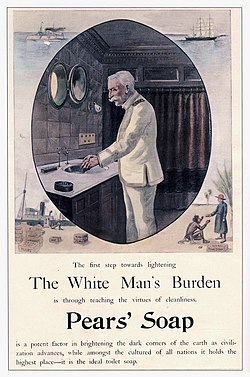Take up the White Man's burden, In patience to abide,
To veil the threat of terror And check the show of pride;
By open speech and simple, An hundred times made plain
To seek another's profit, And work another's gain.
The rest of the poem can be found here, on Wikipedia (yay).
The poem means a few things. The first is that American Imperialism was noticed abroad, and not well favored. The White Man's Burden is the concept used to justify imperialism, and was first used by Europeans colonizing Africa. The theory behind the White Man's Burden is paternalism. Paternalism is the idea that the native peoples of wherever you are colonizing cannot take care of themselves properly and therefore it is your job to go and "civilize" them. Calling imperialism a "Burden" further justifies it by making it into a noble cause, something that Americans could aspire to, and something that was in the best interest of Filipinos.

The above image is an advertisement for soap. The idea is that by bringing sanitation to Africa, and thereby civilizing it. The caption reads, "the first step towards lightening The White Man's Burden is through teaching the virtues of cleanliness. Pears' Soap is a potent factor in brightening the dark corners of the earth as civilization advances, while amongst the cultured of all nations it holds the highest place -- it is the ideal toilet soap". The ad has the added connotation of cleansing the culture of uncivilized nations, with the potential to "[brighten] the dark corners of the earth", which subtly implies making the black citizens of Africa white through colonization.
The theory of paternalism was used in a slightly non-standard manner to justify American imperialism in the Philippines. It was thought that the islands ought to have their independence, but that if they were given the power of self-determination too soon, another great power in the Pacific might take control. Therefore, the United States accepted the "Burden" of governing the islands until it deemed them capable of self rule. This is a sort of paternalism of nations, that America might justify control of the Philippines by declaring itself a parent to the child, and until the child is grown, America would let it go free. And as the "parent" The US would decide when the Philippines would be ready to rule itself. While the theory of paternalism was used to justify the controlling of the Philippine islands, it was proved incorrect when America decided to release the islands after WWII. This proves that the US did not truly care about the development of the island nation (it also chose not to extend the US constitution overseas), but decided that it was too unprofitable to defend.
Sources:
Thank you wikipedia:
This was a thorough explanation of the paternalist aspects of Kipling's well-known poem. Nice source, too. This paternalist interpretation of his poem presents two very different sides to the analysis, though. Some may see his poem as representative of the view that whites are obliged to rule over people from undeveloped nations; this interpretation portrays whites as slightly racist in their condescending view towards people of other nations whom those of European descent have deemed culturally inferior. Contrastingly, another interpretation of the poem presents whites as benevolent in their goodwill towards "primitive peoples". Their willingness to colonize other nations shows that their desire to rule in the best interest of the people from nations that cannot govern themselves. Which of these two views do you think Kipling had in mind when he wrote the poem?
ReplyDeleteI think this is an interesting take on the motivation behind American economic colonization. What do you think America specifically contributed to notions of European/American supremacy, since Kipling's ideas were developed in Europe?
ReplyDelete